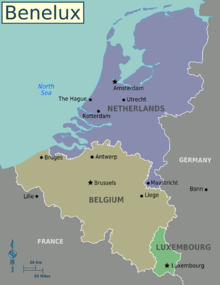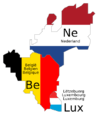Comparison of the Benelux countries
This article is a comparison of the Benelux countries.

Belgium, the Netherlands and Luxembourg form the Benelux
Geography
| Country | Area (km²) | Land area (km²) | Water area (km²) |
|---|---|---|---|
| Belgium [1] | 30,528[1] | 30,278[1] | 250[1] |
| Netherlands[2] | 41,543 [2] | 33,893 [2] | 7,650[2] |
| Luxembourg[3] | 2,586[3] | 2,586 [3] | 0[3] |
Politics
Government
| Country | Political systems | Power source | Power structure |
|---|---|---|---|
| Belgium [1] | Parliamentary system | Constitutional monarchy | Federal state |
| Netherlands [2] | Parliamentary system | Unitary state | |
| Luxembourg[3] | Parliamentary system | ||
| Aruba[4] | Parliamentary system | ||
| Curaçao[5] | Parliamentary system | ||
| Sint Maarten[6] | Parliamentary system |
International organisation membership
| Country | Council of Europe | Benelux Union | ECHR | European Union | NATO | OECDa | United Nations | WTO |
|---|---|---|---|---|---|---|---|---|
| Belgium | 5 May 1949 | Yes | Yes | 1958 | 4 April 1949 | 13 September 1961 | 27 December 1945 | Yes |
| Netherlands | 5 May 1949 | Yes | Yes | 1958 | 4 April 1949 | 13 September 1961 | 10 December 1945 | Yes |
| Luxembourg | 5 May 1949 | Yes | Yes | 1958 | 4 April 1949 | 7 December 1961 | 24 October 1945 | Yes |
a Luxembourg, Netherlands and Belgium were among the founders of the predecessor of the OECD, the OEEC, in 1948
Economy
| Country | GDP total (PPP) | GDP per capita (PPP) | GDP total (nominal) | GDP per capita (nominal) | Gini | HDI |
|---|---|---|---|---|---|---|
| Belgium | $494.620 billion | $43,629 | $458.651 billion | $40,456 | 26.3 | 0.890 |
| Netherlands | $856.265 billion | $50,339 | $762.521 billion | $44,828 | 26.2 | 0.92 |
| Luxembourg | $58.234 billion | $100,991 | $60.176 billion | $104,359 | 28.7 | 0.892 |
Demographics
| Country | Population | Density (per km²) | Immigration (%) |
|---|---|---|---|
| Belgium | 11,250,585 | 363.6 | 2.9 |
| Netherlands | 17,000,059 | 407.8 | 11.1 |
| Luxembourg | 562,958 | 194.1 | 44.5 |
Telecommunication
| Country | Internet TLD | ISO 3166 code | Calling code |
|---|---|---|---|
| Belgium | .be | BE | +32 |
| Netherlands | .nl, .bq | NL | +31, +599 |
| Luxembourg | .lu | LU | +352 |
gollark: > Allows visitors to look and download without authenticating. (A+0)Yes.> Does not log anything about visitors. (A+1)No. Your IP and user agent are logged for purposes.> Follows the criteria in The Electronic Frontier Foundation's best practices for online service providers. (A+2)> Follows the Web “Content” Accessibility Guidelines 2.0 (WCAG 2.0) standard. (A+3)> Follows the Web Accessibility Initiative — Accessible Rich Internet Applications 1.0 (WAI-ARIA 1.0) standard. (A+4)Probably not.> All data contributed by the project owner and contributors is exportable in a machine-readable format. (A+5)No idea. There might be an API.
gollark: > All important site functions work correctly (though may not look as nice) when the user disables execution of JavaScript and other code sent by the site. (A0)I think they *mostly* do.> Server code released as free software. (A1)Yes.> Encourages use of GPL 3-or-later as preferred option. (A2)> Offers use of AGPL 3-or-later as an option. (A3)> Does not permit nonfree licenses (or lack of license) for works for practical use. (A4)See above. Although not ALLOWING licenses like that would be very not free.> Does not recommend services that are SaaSS. (A5)Yes.> Says “free software,” not “open source.” (A6)Don't know if it says either.> Clearly endorses the Free Software Movement's ideas of freedom. (A7)No.> Avoids saying “Linux” without “GNU” when referring to GNU/Linux. (A8)It says neither.> Insists that each nontrivial file in a package clearly and unambiguously state how it is licensed. (A9)No, and this is stupid.
gollark: > All code sent to the user's browser must be free software and labeled for LibreJS or other suitable free automatic license analyzer, regardless of whether the site functions when the user disables this code. (B0)Nope!> Does not report visitors to other organizations; in particular, no tracking tags in the pages. This means the site must avoid most advertising networks. (B1)Yes, it is entirely served locally.> Does not encourage bad licensing practices (no license, unclear licensing, GPL N only). (B2)Again, don't think gitea has this.> Does not recommend nonfree licenses for works of practical use. (B3)See above.
gollark: > All important site functionality that's enabled for use with that package works correctly (though it need not look as nice) in free browsers, including IceCat, without running any nonfree software sent by the site. (C0)I think so. Definitely works in free browsers, don't know if it contains nonfree software.> No other nonfree software is required to use the site (thus, no Flash). (C1)Yes.> Does not discriminate against classes of users, or against any country. (C2)Yes.> Permits access via Tor (we consider this an important site function). (C3)Yes.> The site's terms of service contain no odious conditions. (C4)Yes.> Recommends and encourages GPL 3-or-later licensing at least as much as any other kind of licensing. (C5)I don't think it has much on licensing, so suuuure.> Support HTTPS properly and securely, including the site's certificates. (C6)Definitely.
gollark: I'll run git.osmarks.net through the comparison tables.
References
- "Europe :: Belgium". CIA The World Factbook. Archived from the original on 2016-07-10.
- "Europe :: Netherlands". CIA The World Factbook.
- "Europe :: Luxembourg". CIA The World Factbook. Archived from the original on 2007-06-12.
- "Central America and Caribbean :: Aruba". CIA The World Factbook.
- "Central America and Caribbean :: Curacao". CIA The World Factbook.
- "Central America and Caribbean :: Sint Maarten". CIA The World Factbook.
This article is issued from Wikipedia. The text is licensed under Creative Commons - Attribution - Sharealike. Additional terms may apply for the media files.
